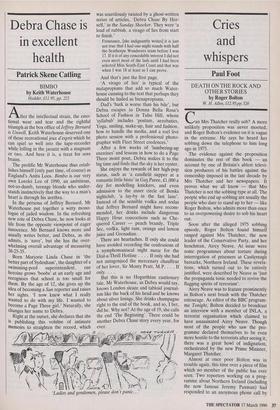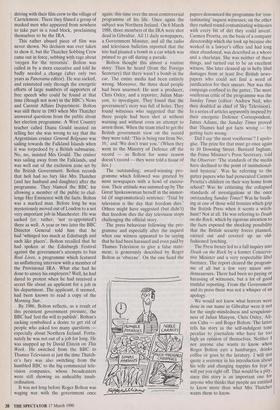Cries and whispers
Paul Foot
DEATH ON THE ROCK AND OTHER STORIES by Roger Bolton W. H. Allen, .112.95,pp.320 Can Mrs Thatcher really sob? A more unlikely proposition was never mooted, and Roger Bolton's evidence on it is vague in the extreme. He says he heard her sobbing down the telephone to him long ago in 1975.
The evidence against the proposition dominates the rest of this book — an account by one of Britain's ablest televi- sion producers of his battles against the censorship imposed in the last decade by Mrs Thatcher and her newspapers. It proves what we all know — that Mrs Thatcher is not the sobbing type at all. The people who end up sobbing are usually the people who dare to stand up to her — like Roger Bolton, who admits more than once to an overpowering desire to sob his heart out.
Soon after the alleged 1975 sobbing episode, Roger Bolton found himself ranged against Mrs Thatcher, the new leader of the Conservative Party, and her henchman, Airey Neave. At issue were some programmes about torture during interrogation of prisoners at Castlereagh barracks, Northern Ireland. These revela- tions, which turned out to be entirely justified, were described by Neave as 'just the propaganda tonic needed to revive the flagging spirits of terrorism'.
Airey Neave was to feature prominently in Bolton's next brush with the Thatcher entourage. As editor of the BBC program- me Tonight, Bolton decided to broadcast an interview with a member of INLA, a terrorist organisation which claimed to have assassinated Airey Neave. Though most of the people who saw the pro- gramme declared themselves to be even more hostile to the terrorists after seeing it, there was a great howl of indignation, orchestrated by the new Prime Minister, Margaret Thatcher.
Almost at once poor Bolton was in trouble again, this time over a piece of film which no member of the public has ever seen. Two reporters working on a prog- ramme about Northern Ireland (including the now famous Jeremy Paxman) had responded to an anoymous phone call by
driving with their film crew to the village of Carrickmore. There they filmed a group of masked men who appeared from nowhere to take part in a road block, proclaiming themselves to be the IRA.
This rather absurd piece of film was never shown. No decision was ever taken to show it, but the Thatcher Sobbing Crew came out in force, sobbing with rage about `oxygen for the terrorists'. Bolton was called in by a stern executive and told he badly needed a change (after only two years as Panorama editor). He was sacked, and reinstated only through the energetic efforts of large numbers of supporters of free speech who could be found at that time (though not now) in the BBC's News and Current Affairs Department. Bolton was still there in 1983 when Mrs Thatcher answered questions from the public about her election programme. A West Country teacher called Diana Gould insisted on telling her she was wrong to say that the Argentinian cruiser General Belgrano was sailing towards the Falkland Islands when it was torpedoed by a British submarine. No, no, insisted Mrs Gould. The cruiser was sailing away from the Falklands, and was well out of the exclusion zone set by the British Government. Bolton records that hell had no fury like Mrs Thatcher (and her husband and daughter) after the programme. They blamed the BBC for allowing a member of the public to chal- lenge Her Eminence with the facts. Bolton was a marked man. Before long he was mysteriously moved out of London to a not very important job in Manchester. He was sacked (er, rather, 'not re-appointed') there as well. A year or two later the BBC Director General told him that he had 'whinged too much at Edinburgh and such like places'. Bolton recalled that he had spoken at the Edinburgh Festival against the government's attempts to ban Real Lives, a programme which featured an unflattering interview with a member of the Provisional IRA. What else had he done to annoy his employers? Well, he had dared to protest when he had received a secret file about an applicant for a job in his department. The applicant, it seemed, had been known to read a copy of the Morning Star.
By 1986, Bolton reflects, as a result of this persistent government pressure, the BBC had 'lost the will to publish'. Bolton's sacking symbolised a desire to get rid of people who asked too many questions especially about Northern Ireland. Fortu- nately he was not out of a job for long. He was snapped up by David Elstein on This Week. He switched from the BBC to Thames Television at just the time Thatch- er's fury was also switching from the humbled BBC to the big commercial tele- vision companies, whose broadcasters were still showing an unhealthy insub- ordination.
It was not long before Roger Bolton was waging war with the government once
again: this time over the most controversial programme of his life. Once again the subject was Northern Ireland. On 6 March 1988, three members of the IRA were shot dead in Gibraltar. All 11 daily newspapers, a Government Minister, and all the radio and television bulletins reported that the trio had planted a bomb in a car which was primed to go off during a parade.
Bolton thought this almost a routine story. Then he heard (from the Foreign Secretary) that there wasn't a bomb in the car. The entire media had been entirely wrong. Moreover, the three dead people had been unarmed. He sent a producer, Chris Oxley, and a reporter, Julian Man- yon, to Mvestigate. They found that the 'government's story was full of holes. They found witnesses who suggested that the three people had been shot at without warning and without even an attempt to arrest them. When the team tried to get the British government view on the record they were told: 'This is being run from No. 10,' and 'We don't trust you.' (When they went to the Ministry of Defence off the record — as Bolton for some reason doesn't record — they were told a tissue of lies.) The outstanding, award-winning pro- gramme which followed was greeted by most newspapers with a howl of execra- tion. Their attitude was summed up by The Great Spokeswoman herself in the immor- tal (if ungrammatical) sentence: 'Trial by television is the day that freedom dies.' Others might have suggested (but didn't) that freedom dies the day television stops challenging the official story.
The press behaviour following the pro- gramme and especially after the inquest when one witness appeared to be saying that he had been harassed and even paid by Thames Television to give a false state- ment, is generously described by Roger Bolton as 'obscene'. On the one hand the papers denounced the programme for 'con- taminating' inquest witnesses; on the other they rushed round contaminating witnesses with every bit of dirt they could invent. Carmen Proetta, on the basis of a company directorship which she took up because she worked in a lawyer's office and had long since abandoned, was described as a whore and a charlatan. She was neither of these things, and turned out to be an excellent witness. She later cleaned up in hefty libel damages from at least five British news- papers who could not find a word of justification for their smears. Nor was this campaign confined to the gutter. The most vociferous critic of the programme was the Sunday Times (editor: Andrew Neil, who then doubled as chief of Sky Television). In a series of articles apparently inspired by their energetic Defence Correspondent, James Adams, the Sunday Times proved that Thames had got facts wrong — by getting facts wrong.
Did I say 'the most vociferous'? I apolo- gise. The prize for that must go once again to 10 Downing Street. Bernard Ingham, the Prime Minister's Press Secretary, told the Observer: 'The standards of the media have declined to the point of institutional- ised hysteria'. Was he referring to the gutter papers who had persecuted Carmen Proetta's children on their way home from school? Was he criticising the collapsed standards of investigations at the once outstanding Sunday Times? Was he baulk- ing at one of those wild frenzies which grip the British Press when it scents a witch- hunt? Not at all. He was referring to Death on the Rock, which by rigorous attention to the facts exposed the shocking possibility that the British security forces planned, carried out and covered up an old- fashioned lynching.
The Press frenzy led to a full inquiry into Death on the Rock by a former Conserva- tive Minister and a very respectable libel barrister. The report cleared the program- me of all but a few very minor mis- demeanours. There had been no paying or harassing of witnesses, but a lot of good truthful reporting. From the Government and its press there was not a whisper of an apology.
We would not know what horrors were done in our name in Gibraltar were it not for the single-mindedness and scrupulous- ness of Julian Manyon, Chris Oxley, Ali- son Cahn — and Roger Bolton. The latter tells his story in the self-indulgent tone peculiar to journalists who have far too high an opinion of themselves. Neither I nor anyone else wants to know when Roger Bolton eats a hamburger, drinks coffee or goes to the lavatory. I will not quote a sentence in his introduction about his wife and changing nappies for fear it will put you right off. That would be a pity, since this story is an important one for anyone who thinks that people are entitled to know more than what Mrs Thatcher wants them to know.



























































 Previous page
Previous page